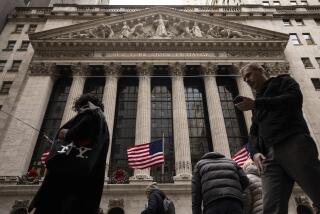Analysts Say War to Worsen Banks’ Outlook : Banking: A long conflict would increase uncertainty among consumers, causing them to further curb spending and borrowing.
- Share via
NEW YORK — A protracted war in the Persian Gulf probably will make things worse for America’s troubled banks, industry strategists said Wednesday.
A long war to extract Iraq from Kuwait would increase uncertainty among consumers who already are spooked by the current recession, causing them to further curb the spending and borrowing that help drive the U.S. economy.
Fewer loans would mean banks profit less on their main business, the difference between what it costs them to borrow and what they charge to lend.
Higher energy prices could prolong the pain for banks by making it more difficult for the country to climb out of the current recession, analysts who follow banking say.
“Absent a war, already the banking industry is under considerable stress,” said James J. McDermott Jr., president of Keefe Bruyette & Woods, a New York investment firm. “War conditions over time will only aggravate the fundamental problems the industry is facing.”
Banks face rising defaults in loans for commercial office buildings and highly leveraged takeover deals, two of the leading areas of reckless bank lending in the 1980s.
These problems are reflected in the fourth-quarter earnings reports of many large banks, which show substantial losses, dividend cuts and millions salted away to cover future delinquent loans.
The only positive result for banks, and the economy in general, would be a “short, sweet war with a decisive victory. Then the price of oil comes down and everyone breathes a sigh of relief and they go out and spend money,” said Bob Kuttner, economics editor of the New Republic magazine.
Nonetheless, many analysts don’t agree with the Bush Administration’s scenario of a short war with minimal economic impact, particularly the cost of energy.
“There’s a lot of worry that the crisis will result in very high energy prices, which affects every business and every individual. It would be a long time before we recover from that,” said Jim Chessen, economist for the American Bankers Assn., a trade group.
In America’s import-dependent economy, higher oil prices could lead to acutely higher inflation by leading to higher prices on everything from heating bills to clothes, and leaving consumers with less money to spend.
The message of energy inflation was underscored Wednesday with a Labor Department report that soaring gasoline and fuel oil prices helped push inflation to 6.1% in 1990, the highest rate in nine years. The report also disclosed that the average American paycheck took its worst tumble during that time.
War and economic uncertainty historically have persuaded many consumers to save money, which theoretically helps banks by increasing the value of their deposits. But bankers don’t expect that to happen this time around.
More to Read
Inside the business of entertainment
The Wide Shot brings you news, analysis and insights on everything from streaming wars to production — and what it all means for the future.
You may occasionally receive promotional content from the Los Angeles Times.










